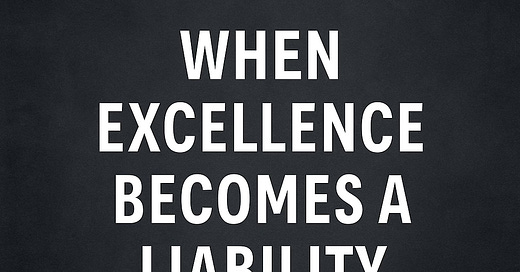Chapter 3: When Excellence Becomes a Liability
From the THX Series Hub - Behind the Mask: The Invisible Labor of Neurodivergent Survival
You would think that solving problems faster would make you more valuable.
You would think that seeing connections no one else sees would lead to recognition.
You would think that being the calmest presence in a storm would secure trust.
But for many neurodivergent people, excellence isn't rewarded. It's punished.
Because excellence—when unmasked—exposes the fragility of systems built on consensus, hierarchy, and emotional pacing.
Why Excellence Triggers Resistance
It disrupts hierarchy. Solutions delivered "too soon" make higher-ups feel exposed or less needed.
It threatens group processing. When a conclusion is reached before others are emotionally ready, it feels jarring—not enlightening.
It challenges unspoken norms. In many systems, being "part of the team" means struggling together, not solving individually.
It creates emotional dissonance. People unconsciously associate difficulty with value. If you make something look too easy, it feels suspect, not brilliant.
How We Mask Excellence to Survive
So we learn:
To delay conclusions.
To frame insights as questions.
To guide others to discover solutions themselves.
To understate certainty.
To wait for emotional readiness, not just logical opportunity.
In short, we learn not just to solve—but to emotionally regulate the pace of discovery for the comfort of others.
THX Frameworks Behind the Masking of Excellence
12 Utilities — Systems lack Clarity and Ease of Use, so excellence looks disruptive instead of helpful.
Prospect Theory — Loss of social status or relational trust feels riskier to others than the gain of a quick solution.
PERMAH — Positive emotion, engagement, and achievement are suppressed to maintain relational security.
Admiration Equation — Skill without emotional timing is punished; awe is reserved for those who "struggle the right way."
Micro-Moments — Every withheld solution, every delayed insight is a micro-moment of survival work.
The Emotional Cost
Under-recognition of talent
Chronic underemployment or stalled promotions
Exhaustion from managing group dynamics instead of just doing the work
Internalized doubt about whether clarity is arrogance
Over time, many neurodivergent people withdraw. Not because they lack ideas—but because sharing them feels like a social liability.
Final Thought
Excellence, when unmanaged by others' emotions, becomes a liability in systems built for conformity.
But brilliance doesn't have to stay hidden.
It can be reclaimed.
It can be honored.
It can redesign the systems that once tried to suppress it.




